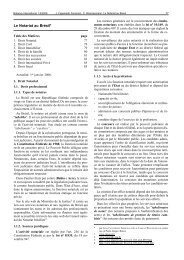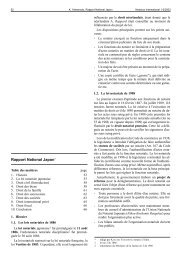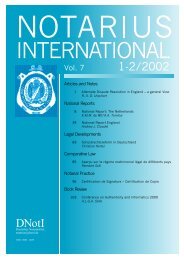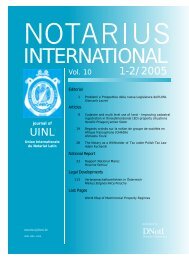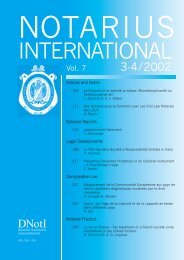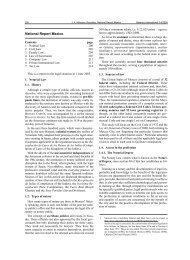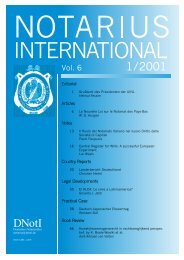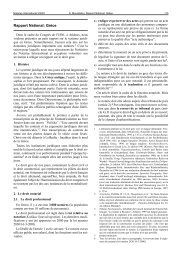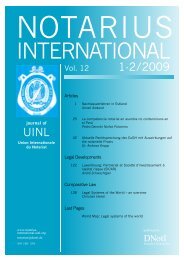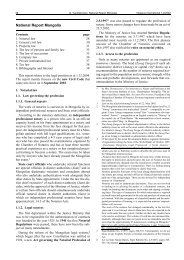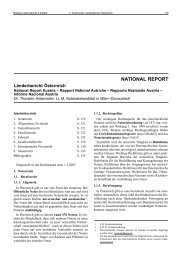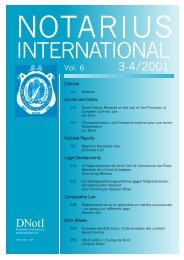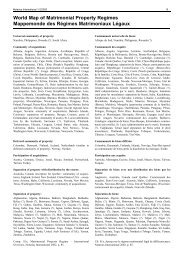You also want an ePaper? Increase the reach of your titles
YUMPU automatically turns print PDFs into web optimized ePapers that Google loves.
208 J. A. Márquez González, National Report Mexico <strong>Notarius</strong> <strong>International</strong> 3-4/<strong>2005</strong><br />
4.2.1. Multiple heirs<br />
The total inheritable estate takes the form of communal<br />
property in the heirs' favour, which thus remains as an integral<br />
unit up to the moment when the division must be<br />
carried out. Therefore, the heirs may in fact dispose of<br />
their right in the total inheritable estate in abstracto, but<br />
they cannot materially dispose of the things making up<br />
the net worth of the estate.<br />
Thus, article 2047 provides that when the right to an estate<br />
is assigned, there is an obligation to assume liability<br />
only in the sole capacity of heir if the things that form part<br />
of it are not listed or identified. Also, article 2291 warns<br />
that any successors can only alienate their rights after the<br />
decease of the person from whom they are inheriting.<br />
One important restriction nevertheless exists. This relates<br />
to the right of pre-emption (tanto) that is retained by<br />
the co-heirs in the case of sale of the rights to inherit.<br />
Thus, the potential seller must give notice through a notary,<br />
by judicial means and with two witnesses, of the basis<br />
on which the sale has been arranged. The co-heirs<br />
have a term of eight days to assert their right. The penalties<br />
are serious if this step is omitted because if the sale<br />
takes place, it will be void.<br />
4.2.2. Legal heirs<br />
Who has the right to inherit in legal succession? In general,<br />
the law provides that the descendants, ascendants,<br />
spouse, collateral relatives within the fourth degree<br />
and cohabitants will inherit, in that precise order. Only<br />
in cases where none of the above exist does the department<br />
of public welfare intervene.<br />
The civil codes of the states of Guanajuato (article<br />
2872), Oaxaca (article 1502) and Puebla (article 3360)<br />
consider collateral relatives up to the sixth degree to be<br />
legitimate heirs.<br />
4.2.3. Who inherits in the absence of heirs?<br />
Sometimes the department of public welfare (article<br />
1636 of the CCFD), other times the State Attorney (article<br />
1569 of the Civil Code of Veracruz), for example.<br />
Nevertheless, it is worth pointing out that the civil codes<br />
of the states of Querétaro (article 1498), Puebla (article<br />
3361) and Tlaxcala (article 2914) divide up the estate,<br />
awarding part to the department of public welfare and another<br />
part to the local university. The civil codes of Guanajuato<br />
(article 2874) and Zacatecas (article 811) go further<br />
and institute the local public university as the sole<br />
heir, without considering the department of public welfare.<br />
The civil codes of Morelos (article 777), Quintana<br />
Roo (article 1539) and Sonora (article 1712) institute the<br />
State as the heir.<br />
Estado de México institutes the Sistema para el Desarrollo<br />
Integral de la Familia del Estado de México (System<br />
for the Integral Development of the Family of Estado de<br />
México) as successor in the absence of any legitimate heir,<br />
in accordance with the provisions contained in article 1465.<br />
4.3. Forced shares and maintenance obligations<br />
The institution of a forced share in the inheritance (legítima)<br />
such as it exists, for example, in Spanish law,<br />
which institutes obligatory heirs in respect of two thirds<br />
of the estate and only considers the remaining third as being<br />
freely disposable (articles 806-808 of the Spanish<br />
Civil Code) does not exist in our legal system. Nevertheless,<br />
it is true that this system existed in the past in the<br />
1870 Civil Code. When this legislation was amended in<br />
1874 the institution of the “legítima” portion of assets<br />
was abandoned and the system was converted to that of<br />
the current code, which allows much greater freedom to<br />
make wills, although, in truth, subject to certain reservations.<br />
In fact, there is a significant series of restrictions on the<br />
maintenance that must be assured for minors under the<br />
age of eighteen; descendants; the surviving spouse when<br />
he or she is unable to work; ascendants; cohabitants and<br />
siblings and other collateral family members within the<br />
fourth degree, in certain cases (article 1368).<br />
One specific rule governing the analysis of these provisions<br />
that restrict the freedom to make a will relates to the<br />
obligation to provide maintenance only in the event that<br />
there are no relatives to a closer degree or such relatives<br />
are unable to provide it. Thus, in his or her will, the testator<br />
must list the persons who, pursuant to this provision,<br />
have a direct duty to fulfil that obligation due to<br />
their proximity of kinship.<br />
It is of interest at this point to refer to the consequences<br />
of failure to comply with the obligation to provide maintenance.<br />
The Civil Code states that the last will and testament<br />
becomes inofficious, and by that it means that the<br />
will must be reduced precisely by a proportion equal to<br />
the amount of maintenance not provided. Thus, the person<br />
omitted in the will only has the right to receive the<br />
pension that should have been paid to him or her, but the<br />
will continues to be intact in all other respects in accordance<br />
with the general principle of law utile per inutile<br />
non vitiatur (article 2238).<br />
Providing a framework for all these provisions relating<br />
to testamentary obligations, article 1376 states that the<br />
obligation to provide maintenance, although incumbent<br />
on the principal of the estate, is finally charged to the total<br />
inheritable estate that is transferred. The only exception<br />
to this is when the testator specifically charges one<br />
of the participants with this obligation to provide maintenance<br />
(article 1376).<br />
4.4. Wills and contracts on succession<br />
The next major chapter in our civil law on succession<br />
relates to the type of will. For this purpose, our Civil<br />
Code describes a will as “a highly personal, revocable,<br />
free act whereby a person with capacity disposes of his<br />
or her assets and rights and declares or fulfils duties for<br />
after his or her decease” (article 1295).<br />
The first section, which relates to wills in general, contains<br />
provisions regarding the manner in which wills are<br />
made, imposing, for example, the obligation that the act<br />
of making a will must be a strictly unilateral act. Thus,<br />
the making of reciprocal wills, i.e. where two people each<br />
make a last will and testament in favour of the other or<br />
both persons make wills in favour of a third person, is<br />
prohibited (article 1296).



